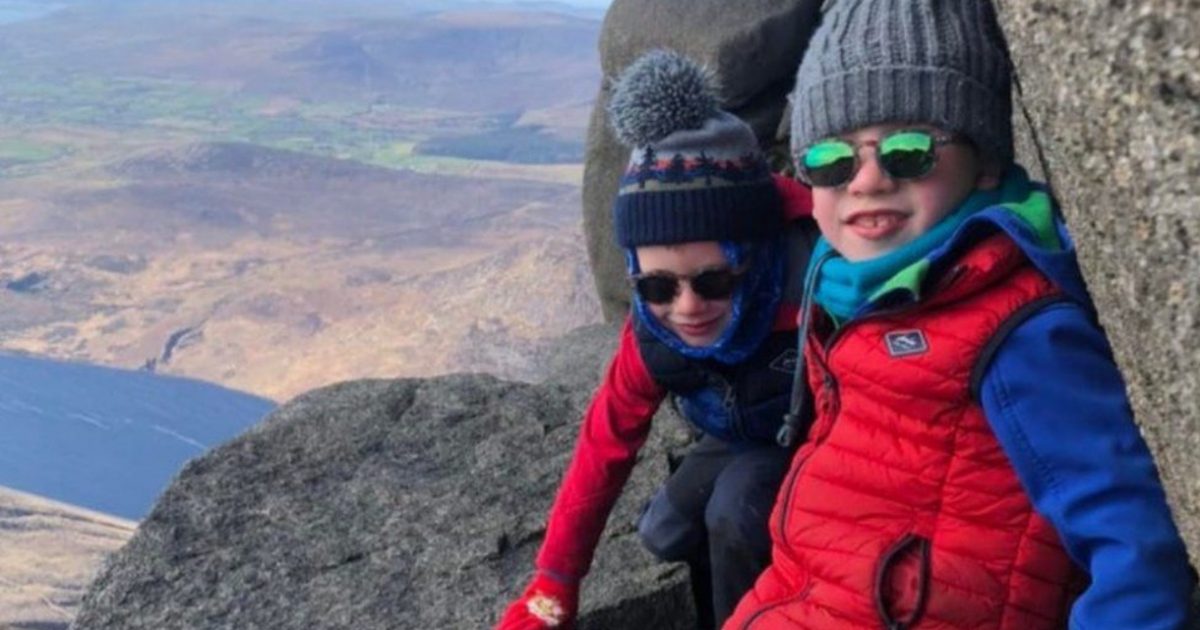Stepping Up for Childhood Cancer
- When 6-year-old twins Rory and Finn McCullough found out their 5-year-old friend Jodi Tomalin was battling cancer, they wanted to do something to help. So, to raise money for three childhood cancer charities, they hiked the seven highest peaks in the Mountains of Mourne in Ireland.
- Jodi was diagnosed with rhabdomyosarcoma after a tumor was discovered in his liver in March of last year. He’s doing better now, but will continue to have chemotherapy treatments until April.
- Being a parent and a cancer caregiver at the same time is a huge responsibility. It's important to take care of yourself and find the time to celebrate life's happy moments along the way.
Rory and Finn McCullough knew their 5-year-old friend Jodi Tomalin was battling cancer. So, they turned to their parents and said they wanted to do something special for him. That something special ended up being the Mourne Mountains Seven Sevens a challenge to hike the seven highest peaks in the Mountains of Mourne in Ireland.
Read MoreThe Impact of a Childhood Cancer Diagnosis on the Whole Family Jayne Wexler Shares Her Story
“The first challenge is complete and what an immense one to start with. Massive congratulations to Rory and Finn McCullough on completing their 7 mountain peak challenge all before the age of 7 years old!” wrote Jodie’s father, Jeremy, in a recent post. “They have raised over £1500 so far and hope to get a little more before their fundraising campaign ends next week so please donate and show your appreciation to the remarkable effort these young adventurers have put in over the past few months. Thank you so much boys (not to mention super parents Christine McCullough and Richard McCullough).”
Jodie’s Cancer Battle
Jodie was diagnosed with rhabdomyosarcoma after a tumor was discovered in his liver in March of last year. Childhood rhabdomyosarcoma is a disease in which malignant (cancerous) cells form in muscle tissue. Symptoms of the disease can vary, but it’s always important to bring your child to the doctor if any changes to their health occur. Possible signs of childhood rhabdomyosarcoma can include:
- A lump or swelling that keeps getting bigger or does not go away. It may be painful.
- Crossed-eyes or bulging of the eye.
- Headache.
- Trouble urinating or having bowel movements.
- Blood in the urine.
- Bleeding in the nose, throat, vagina, or rectum.
For treatment, Jodie underwent six rounds of chemotherapy to try to shrink his tumor. In August, the tumor shrunk enough for the family to travel to a different hospital for surgery to remove the tumor. He also had another three rounds of intense chemotherapy. But thankfully, in mid September 2021, the pathology results showed no cancer in the area.
Jodie still has chemotherapy administered by his parents and a weekly hospital visit to have another chemotherapy drug until next month.
Understanding Childhood Cancer
Treatment advances in recent decades have lead to 84 percent of children with cancer now surviving five years or more, according to the American Cancer Society. This is up from 58 percent from the mid-1970s.
But according to the National Pediatric Cancer Foundation, more than 95 percent of childhood cancer survivors have significant health-related issues because of the current treatment options, and only 4 percent of the billions of dollars spent each year on cancer research and treatments are directed towards treating childhood cancer in the United States. Since 1980, fewer than 10 drugs have been developed for use in children with cancer while hundreds of drugs have been created exclusively for adults.
Dr. Elizabeth Raetz, director of pediatric hematology and oncology at NYU Langone's Perlmutter Cancer Center, reminded us in a previous interview that there is still reason for hope.
"There are also targeted treatments and different immunotherapies that have been studied in adults and have now moved into clinical trials for children and there has been a great deal of excitement in the community about that," Dr. Elizabeth Raetz told SurvivorNet.
Caring for a Child with Cancer
Still, navigating a child's cancer diagnosis can be tricky something Jayne Wexler knows all too well. She had to fill the roles of parent and cancer caregiver when her son, Justice, was diagnosed with ALL. Thankfully, he has since recovered.
In a previous interview with SurvivorNet, Wexler explained how she managed to be a mother and a caregiver all at once.
"I Try To Stay Strong, But Sometimes You Need To Cry": Playing The Role of Cancer Caregiver and Mom
"Being a caregiver is a huge job," Wexler said. "Fortunately, my husband and family were very supportive … it's really hard to see your child go through this. If it could be me, I would take it in a second. You just go on auto-pilot and you just do what you have to do."
But that doesn't mean it was always easy. Wexler admitted that as a parent caring for a child with the disease, you don't have a lot of time to sit down and deal with your own emotions.
"You don't have that much time for yourself," Wexler said. "I try to stay strong, but then sometimes you just want to go and cry, and you need to cry… it's good to cry."
The survival rate for children with cancer has improved over the past few decades, but pediatric cancer is still an incredibly hard thing for a family to go through. In her own caregiving experience, Wexler found therapy to be a great way to process everything happening to her family. Regardless of whether it's therapy or participating in your favorite activities or something entirely different, it's important to find ways to also take care of yourself as you're taking care of your child.
Learn more about SurvivorNet's rigorous medical review process.


